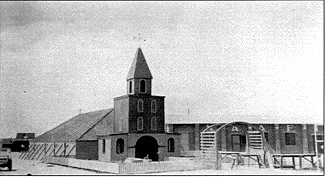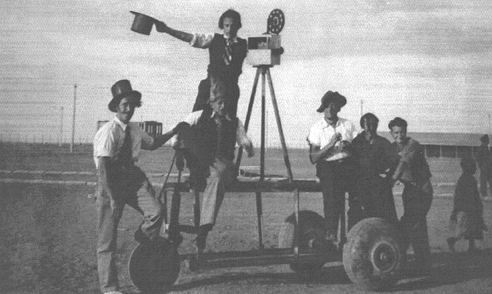REMEMBERING THE POW'S AT EL-FIRDAN - 1948
As Remembered By Don Studman
Now here at No. 10 Motor Transport Repair Unit (MTRU) at El Firdan, instead of Arab fitters, we had German POW’s in the workshops. They had their own separate area on the camp independent of us; they had their own cookhouse, barbers, tailors, medical unit etc. They also had a business going in the form of a souvenir shop made from a huge wooden packing case with a door and window which was parked in our tent lines. In this shop they were selling cigarette cases with covers depicting the Taj-Mahal etc. made from duralumin with toothbrush handles as material for the jewel inserts, polished wooden cantilever sewing boxes among many other things (the materials taken from the U/S (unserviceable) aircraft in the compounds). There were ‘Africa Corps Hats’ on sale in the shop, made from kit bag canvas. We could take in a photograph of a girl friend or wife to them and they had an artist who would paint a portrait from it. The POW’s were well organized, they even made sets of their own clothes and they used to get local women in through the back of the camp (they took pleasure showing us the photographs they had taken of them). All these men were skilled in trades – blacksmiths, instrument makers, fabric craftsmen,, sign writers etc. We had the benefit of getting our watches etc repaired by them. There was an Armenian on the camp selling watches; I took three he was offering along to the instrument section, the POW’s took the backs off examined them and I bought the recommended one for £8
There were occasions when the German POWs were missing the sandwiches they brought in with them for their lunch. After a few such incidents they took action by putting a strong laxative in with the fillings with the result that some of the Arab labourers, that were employed to clean the hangers, went missing.
In time the German POWs were allowed out of camp to within a distance of five miles. Returning from a duty run one night we were waved down by one of them with a nasty slash in his shoulder – he had been attacked and robbed of his watch. We got him on board and made for the nearest military hospital.

I was told that the German POWs at El-Firdan were to be thanked for the church, which they had made from packing cases. Some of these cases were huge; I was told that the newly arrived long wheel back Thorneycroft Coles Crane had been sent out in one. It had two cracked brake drums when it arrived and now faced with a long wait for replacement drums to be sent out, the faulty drums were removed and we drove it around without them. There were many uses made of packing cases, often the smaller wooden cases were used by officers returning home (one was opened to find one of the Harley Davidson motor bikes inside!).
One of the POWs in our group was called Booe which I thought might translate into boy because he was so young. They told me that he was only sixteen when he was sent out here. I think most of the POWs probably considered that while working they were not aware of the time pending their return home and as each vehicle was ready another was brought in from the compounds.
Finally the day came when a little group of us from No. 5/10 MTRU were at Port Said boarding the Empire Windrush, at the same time some of the POWs were boarding another boat to take them home. News came later that not all the German POWs went home from Egypt at that time. At Shallufa there were about 100-150 left behind. Their homes were in the Russian Zone of Germany and they weren’t sent home because of the risk to their lives. They stayed on working in the messes, MT yard, instrument repair shop and various other sections. They also took part in guard duties; RAF personnel had rifles and the POWs carried wooden clubs. Later a number of them found homes in Turkey and the RAF was the worse for their absence. This would have been the same situation at E Firdan and other stations throughout the Canal Zone. They certainly were missed when they left.
Whilst I was at Shallufa (before going to El Firdan) on Christmas afternoon 1947 there was a comic football match against the German POWs and I remember a group of them going round the field as a film crew with a 'film camera' they had made. This was followed by camel races and donkey rides on animals the Arabs had brought in.

The POW's Film Crew with their home-made camera